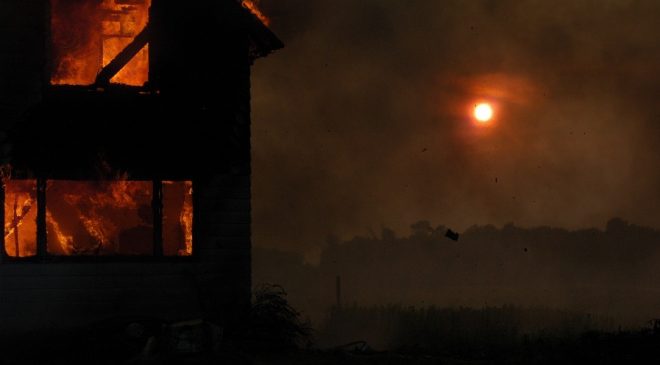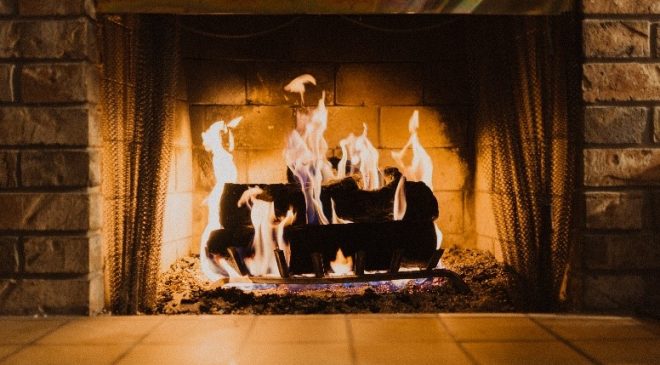Jump Links: Be Present When Cooking | Use Appliances with Care | Check Fireplaces and Other Heat Sources | Don’t Smoke Inside | Store Flammable Liquids Safely | Keep Fire Extinguishers Close By | Maintain Your Dryer | Maintain All Cords | Practice Caution with Candles | Pay Attention to Other Flammable Items in Your Home | Use the Right Light Bulbs & Ensure Light Fixtures are Properly Installed | Preventing House Fires
The outbreak of a fire is one of the most terrifying and deadly events that can happen inside a home. The National Fire Protection Association reports that about 365,500 home fires occurred in America in 2015, causing more than $7 billion in property damage.
The best way to deal with the potential hazards of a fire is to be prepared. Nearly all fires in the home can be avoided simply by taking some reasonable, common sense precautions.
Here are 10 ways to reduce the risk of house fires:

1) Be Present When Cooking
The U.S. Fire Administration reports that 59% of all house fires are due to accidents or problems while cooking. This means that about 165,000 house fires each year begin in the kitchen. So, one of the best ways to prevent a house fire is by making sure you’re attentive when cooking.
Never leave the stove or deep fryers unattended, as grease and oil can splatter onto flammable surfaces and spark a fire. If you do need to leave the kitchen, take the pot off the stove and turn the burner off, before you do, or set you could set a timer to beep after just a couple minutes, so that you can return to the kitchen promptly.
Keep Surfaces and Appliances Clean
Keeping the counters, stove, oven, microwave and other appliances clean and free from leftover oils and food can help reduce the chances of something getting overheated and catching fire. One surface that is often forgotten is the hood of a stove. Wipe down the hood regularly so that grease or oil doesn’t build up.
Keep flammable items such as wooden spoons, towels and paper towels away from hot surfaces. You will want to make sure that pots and pans are clean, and free from oil or other debris before using them. Also, roll up long sleeves and pull longer hair, so that it doesn’t get caught on a burner.
Don’t Cook Under the Influence
It is easy to be careless if you’ve been drinking or taking other mind-altering drugs. Avoid cooking under the influence of anything that might cause you to be less aware. You may also find that you shouldn’t cook when you are overly tired, for the same reason.
2) Use Appliances with Care
Consumer Reports reports that home appliances caused more than $547 million in fire damage between 2006 and 2008, alone. One simple way to protect your home from fire is to keep your appliances, including your dishwasher, clean, maintained and working properly.
Always read and follow the safety instructions included with appliances. Only use the appliance for the function in was intended for and heed any safety warnings. You will want to take the time to register new appliances so that you get notified if there are any recalls or other updates they may need.
Water heaters that run off gas and have a pilot light should be checked regularly to ensure that everything is in working order, and that nothing is close to the heating element. Let appliances completely cool before storing them in a cabinet or cupboard, so that they don’t transfer heat. Don’t put cold water in a hot oiled pan, as the oil and water can splatter, creating a fire hazard.
Keep up with the maintenance on all appliances, so that stay in good shape, working properly. If an appliance starts to act funny, fix it or replace as soon as possible. Don’t use appliances that are not working as they should.
3) Check Fireplaces and Other Heat Sources
If you have a fireplace, but sure to have your chimney cleaned at least twice a year and inspect your flue vents regularly. Don’t burn trash, cardboard or green wood in your chimney to avoid the build-up of creosote. Creosote is a flammable substance, so the heat from a fire can cause the creosote to ignite.
Don’t use gasoline or starter fluid to start the fire in your fireplace, as these can quickly make a fire hard to control. Open the damper before you start the fire, and keep it open until the ashes are completely cooled and the fire is out.

Keep a Class A fire extinguisher close to the fireplace, in case you need to put out a fire quickly. You will also want to take extra care to place both a smoke alarm and a carbon monoxide detector is installed in the room where the fireplace in location. You will also want to test these regularly.
Always let any ashes cool completely in a fireproof or metal container before discarding. The ashes can contain live coals, which may spark a fire if you discard them before they are cooled. Keep firewood at least 30 feet away from your house, not stacked against your porch or close to your backdoor.
Other Heating Sources
Many fire departments recommend avoiding the use of portable or fixed space heaters in the home. This is because spaces heaters are the third leading cause of fires in the home. However, if this is unavoidable to be comfortable in your home, make sure that it is at least three feet away from upholstered furniture or bedding or anything else that is flammable. A fire can easily ignite from debris, cloth or even dust, being too close to a heater, so make sure you clean them regularly.
Have all your heating sources checked out annually by a professional, to ensure that there is no damaged parts that need to be repaired or replace. Make sure your air filters are always cleaned out.
4) Don’t Smoke Inside
While the leading cause of house fires is accidents while cooking, the leading cause of death due to a house fire is from smoking, according to the National Fire Protection Association (NFPA). Almost all smoking fires start from lit cigarettes coming into contact with upholstered furniture or bedding.
The best way to prevent a fire from smoking is to always smoke outside and to be sure that cigarettes butts are put out in the proper receptacle or ashtray. The NFPA also suggests soaking cigarette butts in water before tossing them out, and never tossing a butt into a trash can. Smoking should never be allowed in a home with someone using medical oxygen, because it is explosive.
5) Store Flammable Liquids Safely
Flammable liquids, such as gasoline, kerosene, and propane, should always be carefully stored outside in their original containers. If a container containing any of these types of liquids starts to develop a leak or cracks, transfer its contents into a new container made to store that type of flammable liquid.
When storing lawn equipment away for the season, be sure to empty the gasoline tank and properly dispose of any remaining fuel. The kerosene and propane heaters that have an open flame, should be kept in a well-ventilated area and only used with the proper type of fuel.
6) Keep Fire Extinguishers Close By
Make sure that you have a fire extinguisher on every level of your home, including the basement. When buying a fire extinguisher make sure that it is light and small enough that each adult in your home could operate it. Store fire extinguishers in a place that is easy to get to, so that your access won’t be blocked during an emergency.
According to the U.S Fire Administration, fires typically double in size every 60 seconds, so, it’s vital that you know how to use a fire extinguisher to put out a small fire quickly. You will also want to note what type or size of fire you can use an extinguisher on, and what fires should be put out by firefighters.
The U.S. Fire Administration gives these suggestions regarding how to properly use and operate a fire extinguisher:
Remember the word “PASS:”
Pull the pin. Hold the fire extinguisher with the nozzle pointing away from you and remove the pin to unlock it.
Aim low. Point the nozzle at the base of the fire.
Squeeze the lever slowly and evenly.
Sweep the nozzle from side-to-side.
If you need additional training regarding how (and when) to use a fire extinguisher, your local fire department might offer it. Most fire departments offer free fire extinguisher training to those living around their department.
Fire extinguishers need to be checked once a quarter and tested by a professional every two to three years to ensure they are in good working condition. You will also want to read the instructions to see if your fire extinguisher is one that needs to be shaken each month, in order for it to work properly.
7. Check Your Garden
Many potting soils contain large amounts of peat moss; when peat moss gets overly dry, it becomes highly flammable. There are other items such as bark, Styrofoam and vermiculite in some potting mixes. All of these ingredients can ignite easily in dry conditions.
There are a few simple actions you can take to help keep your home safe from fires that might pop up due to potting soil:
Regularly water potted plants. The soil around your plants should stay moist to prevent it from becoming overly dry. Soil in potted plants typically dries out faster than the ground soil or garden beds.
When possible use clay pots. If a fire does break out, a clay pot will keep it better contained than other types of pots.
When storing potting soil, keep it away from combustible materials. Isolate potting soil so that it doesn’t come into contact with items such as firewood, boxes, cardboard, aerosols, paint solvents, gasoline and cleaning products.
8) Maintain Your Dryer
Gas-powered dryers need to be professionally inspected every year. These inspections will ensure that connections are secure and that the dryer is working the way it should. You will also want to ensure that all lint is removed from the lint trap area at least once a year, either by a professional or with a shop-vac.
Regardless of the type of dryer, be certain to clean out all lint, after every load is finished drying. Get into the habit of regularly checking behind the dryer for lint or items that may have fallen there. Some items could get overheated enough to cause a fire.
9) Maintain All Cords
Avoid plugging multiple appliances into the same outlet to prevent electrical fires from an overloaded electrical socket. Cords and wires should be checked every two to three months to ensure that they are working properly and doesn’t have any faulty or frayed connections.
If you have pets, check to make sure that wires haven’t been chewed before plugging them into an electrical outlet. If you notice any damage to wires, don’t plug them into an power outlet, and replace them as soon as possible.
Only use extension cords as a temporary fix, and don’t overload them, so that they don’t over heat and spark, causing a fire hazard. You will also want to check to make sure that your cords aren’t stuck under a rug or pressed against curtains, because they can become hot, which makes them a fire hazard.
10) Practice Caution with Candles
While many households enjoy using scented candles for the scent and the ambiance, be sure to use them carefully. Always light them in a container that is tip-proof. Lighted candles should be kept away from anything flammable and any item that might get accidentally knocked over.
Most fire departments suggest using a flashlight in the event of a power outage, instead of candles. Keep flashlights in the living area in the case of an unexpected power outage.
Remember to never leave candles unattended, even for just a few minutes. Candles can burn quicker than expected, so make sure to blow them out if you need to leave the room.
If you need to throw any ashes away, make sure you allow them to cool down and dispose of them in a metal container, that is designated just for the ashes.
11) Pay Attention to Other Flammable Items in Your Home
There are a variety of common items in the home that are flammable. These items include aerosols, liquids and some sprays. All of these items need to be treated with care, so that they don’t pose a fire hazard.
Nail Polish
Nail polish should always be stored in a cool dark, place. Make sure the cap is securely on the polish bottle. Storing it in a place with even temperatures will help to prevent destabilization of the formula inside, which will help prevent it from becoming a fire hazard.
Rubbing Alcohol
Rubbing alcohol is another flammable liquid that should also be stored in a cool, dark place, away from anything that might spark. Keep the lid tight on the bottle to avoid any evaporation.
Aerosol Cans
Store all aerosol cans in a cool, dark place, away from any source of heat or flame. Sprays should not be kept close to the stove or oven. Hairsprays are highly flammable and should not be used close to heat. Of course it goes without saying that hairsprays should never be used as a fire starter.
Cooking Oil
Store cooking oil in a cool, dark and dry place. Don’t store any type of oil on or around the stovetop while cooking. You should also never pour hot oil down the drain or garbage disposal. Dispose of used cooking oil in a sealed metal container and throw it out with your regular garbage.
12) Use the Right Light Bulbs & Ensure Light Fixtures are Properly Installed
Double check that you’re using the right wattage light bulbs in all your light fixtures and lamps. The higher the wattage the greater the heat. A watt is actually a unit of heat, and is measured by the amount of energy a light bulb uses. You could also consider using LED bulbs which emit less heat that the incandescent or halogen options. Regardless of the type of bulb, never exceed the maximum watts recommended.

Don’t leave lights on in your house if you’re not home. There are certain types of lamps and light fixtures that can catch fire if they become too hot. If you’re not home, you won’t be able to respond should a lamp start to spark. It is safer to leave the lights off than to risk a firing breaking out when you’re away from home.
Make sure that all lamp shades fit properly, and don’t touch a hot light bulb. Many electrical fires start due to poorly installed light fixtures. Make sure that hanging lights are properly insulated from any type of wood paneling or joists.
Portable lamps should only be set on sturdy, stable bases.
Preventing House Fires
While we will never be able to eliminate all potential causes of house fires these are just a few of the basics to keep in mind. If you take these precautions, you will decrease the risk of igniting or experiencing a house fire.
